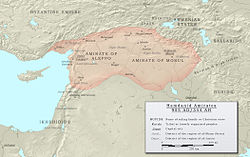Hamdanid dynasty
This article may be expanded with text translated from the corresponding article in Arabic. (July 2013) Click [show] for important translation instructions.
|
Hamdanid Dynasty الحمدانيون Hamdaniyun | |||||||||||
|---|---|---|---|---|---|---|---|---|---|---|---|
| 895–1002 | |||||||||||
 Hamdanids in 955 during the rule of Sayf ad-Dawla. | |||||||||||
| Capital | Aleppo (944-1002) | ||||||||||
| Common languages |
| ||||||||||
| Religion | Shia Islam (including Alawiya) | ||||||||||
| Government | Hereditary monarchy | ||||||||||
| Emir | |||||||||||
| Historical era | Middle Ages | ||||||||||
• Established | 895 | ||||||||||
• Husayn ibn Hamdan establishes himself as leader of Al-Jazira for the Abbasids. | 895 | ||||||||||
• Sayf al-Dawla establishes himself in Aleppo after successfully countering the Ikhshidids of Egypt. | 944 | ||||||||||
• Disestablished | 1002 | ||||||||||
| |||||||||||
| Today part of |
| ||||||||||
| Historical Arab states and dynasties | ||||||||||||||||||||||||||||||||||||||||||||||||||||||||||||
|---|---|---|---|---|---|---|---|---|---|---|---|---|---|---|---|---|---|---|---|---|---|---|---|---|---|---|---|---|---|---|---|---|---|---|---|---|---|---|---|---|---|---|---|---|---|---|---|---|---|---|---|---|---|---|---|---|---|---|---|---|
 | ||||||||||||||||||||||||||||||||||||||||||||||||||||||||||||
Ancient Arab States
| ||||||||||||||||||||||||||||||||||||||||||||||||||||||||||||
Arab Empires
| ||||||||||||||||||||||||||||||||||||||||||||||||||||||||||||
Eastern Dynasties
| ||||||||||||||||||||||||||||||||||||||||||||||||||||||||||||
Western Dynasties
| ||||||||||||||||||||||||||||||||||||||||||||||||||||||||||||
Arabian Peninsula
| ||||||||||||||||||||||||||||||||||||||||||||||||||||||||||||
Current monarchies
| ||||||||||||||||||||||||||||||||||||||||||||||||||||||||||||

Family tree of the Hamdanid dynasty
The Hamdanid dynasty (Arabic: حمدانيون Ḥamdānyūn) was a Shi'a[1]Muslim Arab dynasty of northern Iraq (al-Jazirah) and Syria (890-1004). They descended from the ancient Banu Taghlib Christian tribe of Mesopotamia and Eastern Arabia.
The Hamdanid dynasty was founded by Hamdan ibn Hamdun (after whom it is named), when he was appointed governor of Mardin in SE Anatolia by the Abbasid Caliphs in 890.
His son Abdallah (904-929) was in turn appointed governor of Mosul in northern Iraq (906) and even governed Baghdad (914). His sons were installed as governors in Mosul and Aleppo.
The rule of Hassan Nasir al-Dawla (929-968), governor of Mosul and Diyar Bakr, was sufficiently tyrannical to cause him to be deposed by his own family.
His lineage still ruled in Mosul, a heavy defeat by the Buyids in 979 notwithstanding, until 990. After this, their area of control in northern Iraq was divided between the Uqaylids and the Marwanids.
Ali Sayf al-Dawla 'Sword of the State' ruled (945-967) Northern Syria from Aleppo, and became the most important opponent of the Christian Byzantine Empire's re-expansion. His court was a centre of culture, thanks to its nurturing of Arabic literature, but it lost this status after the Byzantine conquest of Aleppo.
To stop the Byzantine advance, Aleppo was put under the suzerainty of the Fatimids in Egypt, but in 1003 the Fatimids deposed the Hamdanids anyway.
Contents
1 Hamdanid rulers
2 See also
3 References
4 Sources
Hamdanid rulers
Hamdanids in Al-Jazira
- Hamdan ibn Hamdun
al-Husayn ibn Hamdan (895-916)
Abdallah ibn Hamdan (906-929)
Nasir al-Dawla (929-967)
Abu Taghlib (967-978)- Directly administered as part of the Buyid-controlled Abbasid Caliphate, 979–981
Abu Tahir Ibrahim ibn al-Hasan (989-997)
Abu Abdallah al-Husayn ibn al-Hasan (989-997)
Hamdanids in Aleppo
Sayf al-Dawla (945-967)
Sa'd al-Dawla (967-991)
Sa'id al-Dawla (991-1002)
See also
- Rulers of Aleppo
- List of Shi'a Muslim dynasties
- Mirdasids
References
^ شاكر مصطفى, موسوعة دول العالم الأسلامي ورجالها الجزء الأول, (دار العلم للملايين: 1993), p.352
Sources
Bikhazi, Ramzi J. (1981). The Hamdanid Dynasty of Mesopotamia and North Syria 254–404/868–1014. Ann Arbor: University of Michigan..mw-parser-output cite.citation{font-style:inherit}.mw-parser-output q{quotes:"""""""'""'"}.mw-parser-output code.cs1-code{color:inherit;background:inherit;border:inherit;padding:inherit}.mw-parser-output .cs1-lock-free a{background:url("//upload.wikimedia.org/wikipedia/commons/thumb/6/65/Lock-green.svg/9px-Lock-green.svg.png")no-repeat;background-position:right .1em center}.mw-parser-output .cs1-lock-limited a,.mw-parser-output .cs1-lock-registration a{background:url("//upload.wikimedia.org/wikipedia/commons/thumb/d/d6/Lock-gray-alt-2.svg/9px-Lock-gray-alt-2.svg.png")no-repeat;background-position:right .1em center}.mw-parser-output .cs1-lock-subscription a{background:url("//upload.wikimedia.org/wikipedia/commons/thumb/a/aa/Lock-red-alt-2.svg/9px-Lock-red-alt-2.svg.png")no-repeat;background-position:right .1em center}.mw-parser-output .cs1-subscription,.mw-parser-output .cs1-registration{color:#555}.mw-parser-output .cs1-subscription span,.mw-parser-output .cs1-registration span{border-bottom:1px dotted;cursor:help}.mw-parser-output .cs1-hidden-error{display:none;font-size:100%}.mw-parser-output .cs1-visible-error{font-size:100%}.mw-parser-output .cs1-subscription,.mw-parser-output .cs1-registration,.mw-parser-output .cs1-format{font-size:95%}.mw-parser-output .cs1-kern-left,.mw-parser-output .cs1-kern-wl-left{padding-left:0.2em}.mw-parser-output .cs1-kern-right,.mw-parser-output .cs1-kern-wl-right{padding-right:0.2em}
Canard, Marius (1951). Histoire de la dynastie des Hamdanides de Jazîra et de Syrie (in French). Algiers: Faculté des Lettres d'Alger. OCLC 715397763.
Freytag, G. W. (1856). "Geschichte der Dynastien der Hamdaniden in Mosul und Aleppo". Zeitschrift der Deutschen Morgenländischen Gesellschaft (in German). X: 432–498.
Freytag, G. W. (1857). "Geschichte der Dynastien der Hamdaniden in Mosul und Aleppo". Zeitschrift der Deutschen Morgenländischen Gesellschaft (in German). XI: 177–252.
Kennedy, Hugh N. (2004). The Prophet and the Age of the Caliphates: The Islamic Near East from the 6th to the 11th Century (Second Edition). Harlow, England: Longman. ISBN 978-0-58-240525-7.
- Hukam (Arabic)